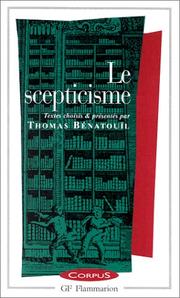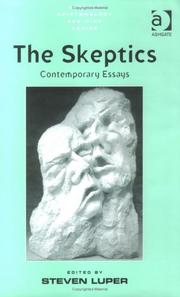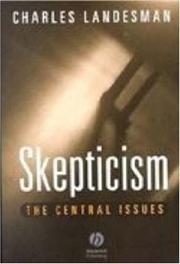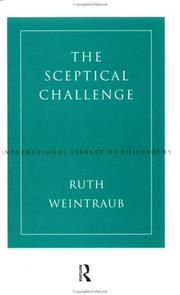| Listing 1 - 10 of 230 | << page >> |
Sort by
|
Book

ISBN: 3110671484 3110671441 Year: 2021 Publisher: Berlin ; Boston : De Gruyter,
Abstract | Keywords | Export | Availability | Bookmark
 Loading...
Loading...Choose an application
- Reference Manager
- EndNote
- RefWorks (Direct export to RefWorks)
Scepticism has been the driving force in the development of Greco-Roman culture in the past, and the impetus for far-reaching scientific achievements and philosophical investigation. Early Jewish culture, in contrast, avoided creating consistent representations of its philosophical doctrines. Sceptical notions can nevertheless be found in some early Jewish literature such as the Book of Ecclesiastes. One encounters there expressions of doubt with respect to Divine justice or even Divine involvement in earthly affairs. During the first centuries of the common era, however, Jewish thought, as reflected in rabbinic works, was engaged in persistent intellectual activity devoted to the laws, norms, regulations, exegesis and other traditional areas of Jewish religious knowledge. An effort to detect sceptical ideas in ancient Judaism, therefore, requires a closer analysis of this literary heritage and its cultural context.This volume of collected essays seeks to tackle the question of scepticism in an Early Jewish context, including Ecclesiastes and other Jewish Second Temple works, rabbinic midrashic and talmudic literature, and reflections of Jewish thought in early Christian and patristic writings. Contributors are: Tali Artman, Geoffrey Herman, Reuven Kiperwasser, Serge Ruzer, Cana Werman, and Carsten Wilke.

ISBN: 2080730142 9782080730145 Year: 1997 Volume: 3014 Publisher: Paris : Flammarion,
Abstract | Keywords | Export | Availability | Bookmark
 Loading...
Loading...Choose an application
- Reference Manager
- EndNote
- RefWorks (Direct export to RefWorks)
Ongeloof --- Scepticism --- Scepticisme --- Skepticism --- Unbelief --- Skepticism. --- Sceptiques (philosophie grecque) --- Anthologies
Book
ISBN: 0710036396 Year: 1968 Publisher: London Routledge and Kegan Paul
Abstract | Keywords | Export | Availability | Bookmark
 Loading...
Loading...Choose an application
- Reference Manager
- EndNote
- RefWorks (Direct export to RefWorks)
Skepticism --- Scepticisme --- Scepticism --- Unbelief --- Agnosticism --- Belief and doubt --- Free thought

ISBN: 0754614212 Year: 2003 Publisher: Aldershot Ashgate
Abstract | Keywords | Export | Availability | Bookmark
 Loading...
Loading...Choose an application
- Reference Manager
- EndNote
- RefWorks (Direct export to RefWorks)
Skepticism --- Scepticism --- Unbelief --- Agnosticism --- Belief and doubt --- Free thought

ISBN: 0631213562 0631213554 Year: 2002 Publisher: Oxford Blackwell
Abstract | Keywords | Export | Availability | Bookmark
 Loading...
Loading...Choose an application
- Reference Manager
- EndNote
- RefWorks (Direct export to RefWorks)
Skepticism. --- Skepticism --- Scepticism --- Unbelief --- Agnosticism --- Belief and doubt --- Free thought
Book
ISBN: 3110557606 3110557533 3110558351 Year: 2019 Publisher: Berlin/Boston De Gruyter
Abstract | Keywords | Export | Availability | Bookmark
 Loading...
Loading...Choose an application
- Reference Manager
- EndNote
- RefWorks (Direct export to RefWorks)
Socrates, Or On Human Knowledge, published in Venice in 1651, is the only work written by a Jew that contains so far the promise of a genuinely sceptical investigation into the validity of human certainties. Simone Luzzatto masterly developed this book as a pièce of theatre where Socrates, as main actor, has the task to demonstrate the limits and weaknesses of the human capacity to acquire knowledge without being guided by revelation. He achieved this goal by offering an overview of the various and contradictory gnosiological opinions disseminated since ancient times: the divergence of views, to which he addressed the most attention, prevented him from giving a fixed definition of the nature of the cognitive process. This obliged him to come to the audacious conclusion of neither affirming nor denying anything concerning human knowledge, and finally of suspending his judgement altogether.This work unfortunately had little success in Luzzatto's lifetime, and was subsequently almost forgotten. The absence of substantial evidence from his contemporaries and that of his epistolary have thus increased the difficulty of tracing not only its legacy in the history of philosophical though, but also of understanding the circumstances surrounding the writing of his Socrates.The present edition will be a preliminary study aiming to shed some light on the philosophical and historical value of this work's translation, indeed it will provide a broader readership with the opportunity to access this immensely complicated work and also to grasp some aspects of the composite intellectual framework and admirable modernity of Venetian Jewish culture in the ghetto.
Judaism --- Jewish studies --- Jewish Scepticism. --- Simone Luzzatto. --- Socrates.

ISBN: 0415139465 Year: 1997 Publisher: London Routledge
Abstract | Keywords | Export | Availability | Bookmark
 Loading...
Loading...Choose an application
- Reference Manager
- EndNote
- RefWorks (Direct export to RefWorks)
Skepticism --- Scepticism --- Unbelief --- Agnosticism --- Belief and doubt --- Free thought --- Skepticism.
Book
ISBN: 3110664747 3110661012 Year: 2020 Publisher: De Gruyter
Abstract | Keywords | Export | Availability | Bookmark
 Loading...
Loading...Choose an application
- Reference Manager
- EndNote
- RefWorks (Direct export to RefWorks)
As scepticism has rarely been studied in the context of the Arabic culture and its Judeo-Arabic sub-culture, it is small wonder that sceptical motifs of Judah Halevi’s classic theological The Kuzari (written ca. 1140) received very little scholarly attention so far. Thus, the present study seeks to shed light on Halevi’s wrestling with the dogmatic-rationalistic trends of his period from an angle of this much less studied perspective. As a by-product, this study is a contribution to the mainly uncultivated field of traces of scepticism in the Arabic culture.
Judeo-Arabic. . --- Scepticism, Fideism, Arabic. --- RELIGION / Judaism / Theology. --- Judeo-Arabic.
Book
ISBN: 9781847061737 1847061737 Year: 2008 Publisher: London Continuum
Abstract | Keywords | Export | Availability | Bookmark
 Loading...
Loading...Choose an application
- Reference Manager
- EndNote
- RefWorks (Direct export to RefWorks)
Skepticism. --- Skepticism --- Scepticism --- Unbelief --- Agnosticism --- Belief and doubt --- Free thought
Book
ISBN: 9077070443 Year: 2003 Publisher: Kampen Klement
Abstract | Keywords | Export | Availability | Bookmark
 Loading...
Loading...Choose an application
- Reference Manager
- EndNote
- RefWorks (Direct export to RefWorks)
Skepticism --- Scepticism --- Unbelief --- Agnosticism --- Belief and doubt --- Free thought --- Philosophy
| Listing 1 - 10 of 230 | << page >> |
Sort by
|

 Search
Search Feedback
Feedback About UniCat
About UniCat  Help
Help News
News